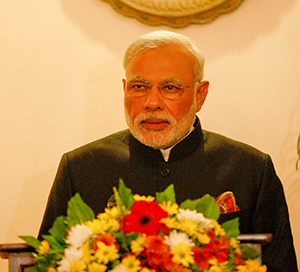TRADE RELATIONS
Modi hosts BRICS leaders amid bloc’s economic woes
 Benaulim, India | AFP | Sunday 10/16/2016 – Indian Prime Minister Narendra Modi hosted leaders of the BRICS emerging powers on Sunday at a summit seeking to strengthen trade ties and help overcome the bloc’s economic woes.
Benaulim, India | AFP | Sunday 10/16/2016 – Indian Prime Minister Narendra Modi hosted leaders of the BRICS emerging powers on Sunday at a summit seeking to strengthen trade ties and help overcome the bloc’s economic woes.
Modi and the leaders of Brazil, Russia, China and South Africa smiled and raised locked hands for a group photo in an Indian beachside resort, before holding talks on the tough task of forging stronger economic cooperation.
“I firmly believe that the simultaneous development of Brazil, Russia, China, South Africa and India is the best bet for global growth and development,” Modi told leaders at the summit venue in Benaulim, a town in the western state of Goa.
BRICS was formed in 2011 with the aim of using its growing economic and political influence to challenge Western hegemony.
The nations, with a joint estimated GDP of US$ 16 trillion, set up their own bank in parallel to the Washington-based International Monetary Fund and World Bank, and hold summits rivalling the G7 forum.
But the countries, accounting for 53 percent of the world population, have been hit by falling global demand and lower commodity prices, while several have also been mired in corruption scandals.
Russia and Brazil have fallen into recession recently, South Africa only just managed to avoid the same fate last month and China’s economy has slowed sharply, although it is still the world’s second-largest.
India by contrast is now the world’s fastest-growing major economy in an otherwise gloomy environment.
Commentators have raised doubts about the bloc’s clout, given its economic problems.
A Chinese media website, however, warned against writing off BRICS. It said the club remained an economic force despite slowdowns and differences among its members, such as China’s territorial disputes along the border with neighbouring India.
“Western countries have always been sceptical toward non-Western international cooperation, and their opinions on the Goa summit are no different,” the Global Times, closely linked to the Chinese Communist Party, said in an editorial.
“Since the establishment of BRICS, speculations of disunity among the countries and decline in their power have emerged one after another.”
“Compared with the situation in the West (however), BRICS countries still hold comparative advantages for development.”
After a series of bilateral meetings on Saturday that saw Russia and India sign lucrative energy and defence deals, Modi will be seeking BRICS cooperation on enhancing trade and investment, as well as on combating climate change.
Modi is also expected to lead talks on threats to regional and global security, including recent cross-border attacks blamed on militants in India’s arch-rival Pakistan. These have sharply raised tensions between the neighbours.
Modi wants to isolate Pakistan internationally, following fury at home over the attacks that have left some 25 Indian soldiers dead.
Analysts, however, are sceptical of India’s chances of securing a joint BRICS condemnation, given China’s strong diplomatic support for Pakistan and Russia’s efforts to forge closer defence ties with Islamabad.
Taking place at the same time in Goa is a meeting of heads of a seven-nation grouping called BIMSTEC, loosely based around the Bay of Bengal.
Myanmar’s Aung Sang Suu Kyi, Bangladesh Prime Minister Sheikh Hasina, and the leaders of Sri Lanka, Bhutan and Nepal are set to hold talks also focussed on trade. Thailand’s prime minister is not attending.




